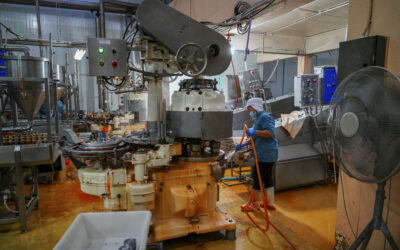Le Manufacturing Execution System (MES) est un outil essentiel pour les entreprises cherchant à optimiser leurs processus de production. Il assure le pilotage et le suivi en temps réel des opérations de fabrication dans l’atelier. Ce système permet d’améliorer la qualité, la traçabilité et l’efficacité des processus industriels, tout en offrant une vue complète des données de production pour une meilleure prise de décision.
Qu’est-ce qu’un Manufacturing Execution System?
Un MES est un logiciel utilisé dans les usines pour superviser l’exécution des activités de production. Il collecte des données en temps réel sur les machines, les opérateurs et les produits, permettant une gestion efficace des processus de fabrication. Le MES garantit que chaque opération respecte les normes de qualité tout en optimisant les performances des activités industrielles.
Fonctionnalités Clés du MES
Le MES peut offrir diverses fonctionnalités telles que la gestion des opérations en temps réel, le suivi de la performance des machines, et la gestion des ordres de travail. Il facilite aussi le contrôle de la qualité, la traçabilité des produits, et l’intégration des données de production dans le système global de l’entreprise.
Différence entre MES et ERP
Bien que le MES et l’ERP soient des systèmes de gestion essentiels, ils remplissent des fonctions différentes. L’ERP gère les aspects globaux de l’entreprise comme la comptabilité et les ressources humaines, tandis que le MES est centré sur la production en temps réel dans l’atelier. Le MES se concentre sur l’exécution des processus de fabrication et l’optimisation des performances des opérations.
MES et Automates : Comment ça fonctionne?
Le MES fonctionne souvent en coordination avec les automates des machines. (PLC, Programmable Logic Controllers en anglais) pour assurer une surveillance continue des machines et des opérations. Le système MES récupère les données des PLC, fournissant des informations précises sur l’état des équipements, les cycles de production et les éventuels problèmes. Cette intégration améliore la réactivité en cas de panne ou de déviation de la qualité.
Avantages de l’Intégration d’un MES
L’intégration d’un MES dans une usine permet d’améliorer l’efficacité des processus de production en offrant une vue d’ensemble des activités. Il permet de réduire les erreurs, d’optimiser les temps d’arrêt des machines, et de garantir un meilleur respect des normes de qualité. Grâce à la traçabilité, les entreprises peuvent rapidement identifier et corriger les problèmes de production, garantissant ainsi une amélioration continue.
Comment un MES Améliore la Performance de Production?
Un MES permet un suivi précis de chaque étape de la fabrication. En analysant les données en temps réel, il optimise les temps de production, réduit les arrêts et améliore la qualité des produits finis. Grâce à des fonctions de gestion des performances, le MES permet une prise de décision plus rapide, maximisant ainsi l’efficacité des opérations et des processus.
MES dans le Contexte de la Smart Industrie
Dans le cadre de l’Industrie 4.0, le MES est un pilier central du secteur industriel. Il s’intègre avec d’autres systèmes intelligents, comme les capteurs IoT et l’intelligence artificielle, pour offrir une traçabilité complète et des informations en temps réel. Le MES permet aux usines d’adopter une approche de fabrication plus agile, en adaptant rapidement les processus de production aux nouvelles exigences du marché.
Études de Cas et Exemples Concrets
Plusieurs entreprises dans divers secteurs ont réussi à transformer leurs processus de production grâce à l’implémentation d’un MES. Par exemple, une usine de fabrication automobile a pu réduire ses temps d’arrêt de 20 % grâce à une meilleure gestion des machines et un suivi précis de la qualité des produits. Ce type de solution permet aux industriels d’améliorer la performance globale de leur activité et de gagner un avantage concurrentiel.
Restez connecté :
Pour ne rien manquer de l’actualité de TEEPTRAK et de l’industrie 4.0, suivez nous sur LinkedIn et YouTube. Inscrivez-vous également à notre newsletter pour recevoir le récap mensuel !
Ceci pourrait également vous intéresser :




0 Comments